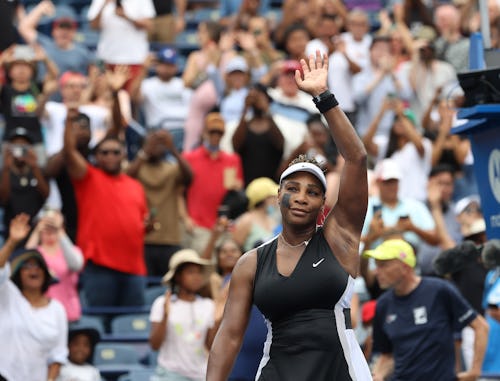
Serena Williams is stepping off the court. The legendary tennis player announced her retirement, or in her words, her “evolution,” in a candid and moving essay in Vogue. Williams, 41, will exit the sport as one of its most decorated players ever and with a legacy that firmly puts her in the conversation as one of the greatest modern athletes.
But her essay, as told to writer Rob Haskell, was less a celebration of her triumphs than a startlingly honest reflection about the challenge of leaving the sport, what drove her in her career, and what her legacy will be.
“I have never liked the word retirement ... Maybe the best word to describe what I’m up to is evolution,” the 23-time Grand Slam champion said. “I’m here to tell you that I’m evolving away from tennis, toward other things that are important to me. A few years ago I quietly started Serena Ventures, a venture capital firm. Soon after that, I started a family. I want to grow that family.”
Yet while motherhood is a primary reason in her decision to leave tennis, Williams, whose daughter turns five in August, notes the double standard for her as a female athlete. “Believe me, I never wanted to have to choose between tennis and a family. I don’t think it’s fair. If I were a guy, I wouldn’t be writing this because I’d be out there playing and winning while my wife was doing the physical labor of expanding our family. Maybe I’d be more of a Tom Brady if I had that opportunity.”
Motherhood, she said, has been something that “all just makes sense,” whereas tennis has been defined by sacrifice and the determination against her doubters. “To me that’s kind of the essence of being Serena: expecting the best from myself and proving people wrong,” she said. “There were so many matches I won because something made me angry or someone counted me out. That drove me. I’ve built a career on channeling anger and negativity and turning it into something good. ”
She also credited her sister Venus as the trailblazer whose early career was instrumental to her own rise: “That’s how I started to move so fast up the rankings, because I learned the lessons from Venus’s losses instead of the hard way, from my own.”
Williams, who first went pro in 1995, was forthright about the difficulty of her decision; leaving tennis is something that she said she has only been able to speak to her therapist about. “There is no happiness in this topic for me,” she said. “I know it’s not the usual thing to say, but I feel a great deal of pain. It’s the hardest thing that I could ever imagine. I hate it. I hate that I have to be at this crossroads.”
While Williams did not give a specific date to her official exit, she hinted that the upcoming U.S. Open may be her last tournament. There, she will have the opportunity to tie Maragret Court’s record of 24 grand slam titles (which was recorded before tennis’s modern “open era”), a milestone that she admits has driven her. “But these days, if I have to choose between building my tennis résumé and building my family, I choose the latter,” she said.
As for what she leaves behind, Williams was uneasy about how exactly to define the legacy of one of the most illustrious and dominant careers in sports. “I get asked about it a lot, and I never know exactly what to say. But I’d like to think that thanks to opportunities afforded to me, women athletes feel that they can be themselves on the court,” she said. “They can play with aggression and pump their fists. They can be strong yet beautiful. They can wear what they want and say what they want and kick butt and be proud of it all.”







